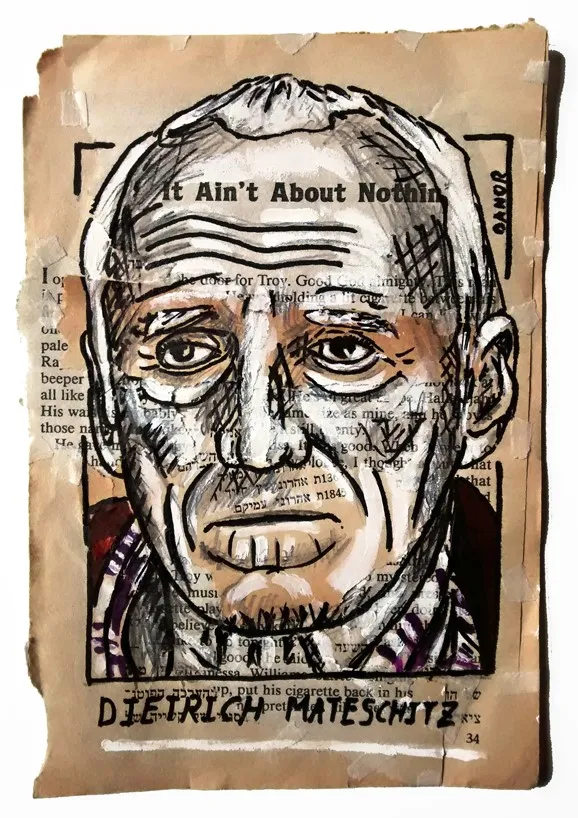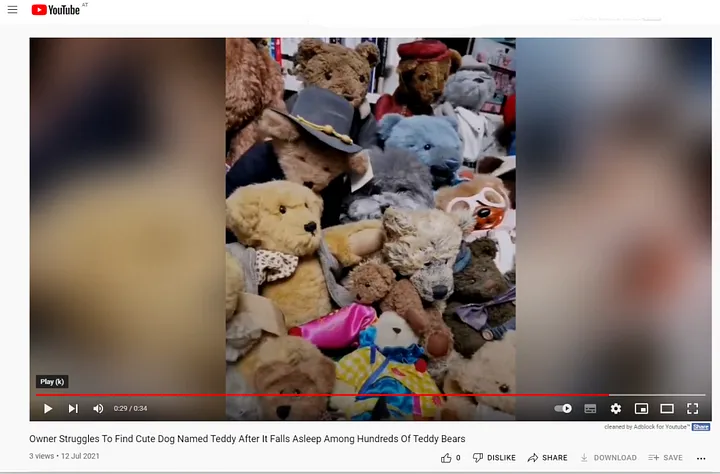Red Bull’s Dietrich Mateschitz And The Interview That Was Never Published
I think the PR team for Red Bull were puzzled as to why their boss, Dietrich Mateschitz, chose to give me one of his very few interviews back in 2005, seeing that he rarely gave more than one interview to journalists a year.
I had asked them why he said yes, and it was clear they had no idea, but then again, they didn’t know my role in helping make his business what it was even back then, when it was already selling 2.5 billion cans annually.
Who can blame them? Most people, even PR agencies, know little of what a news agency does beyond Reuters or Associated Press, yet every day small agencies like ours can change the world; we can build things up, and we can knock them down.
Collage portrait of Mateschitz by Danor Shtruzman
Mateschitz was clearly aware of that, after all, he pioneered the idea of event marketing, using the media for free and instead funding the events that we chose to write about. He proudly told me when we met for the interview in 2005 that he had never spent a penny on traditional advertising.

With our agency, of course, he didn’t need to as that is not how we work. We don’t get paid by the people or companies we write about. We prefer to be able to write what we want, and not what we are told to write, so the publicity we provide as a side product is free to those we work with, if the subject is worth it.
Red Bull ticked that box right from the start, and so the Austrian energy company and the country’s only tabloid news agency came together and did what both do very well in putting Red Bull on the international stage.
Sadly, only one of us became rich, but that was never the point for me, as what I cared about was simply writing.
I only truly discovered my passion for journalism when I worked at my first news agency after being deputy news editor on the national newspaper for Wales, the Western Mail. After I made the switch from the daily paper to working for a local Cardiff-based news agency, I found that on the one hand, you have even more power and influence, in fact infinitely more, yet on the other hand, even less recognition either as an agency or an individual. Yes, the stories that we create changed the world, yet we almost never get the byline or the recognition for the work.
So while starting my career chasing stories and not getting famous, Mr Mateschitz was on his journey to becoming famous and very rich by realising the potential for the energy drink Red Bull. He had first noticed it on a trip to Thailand in 1982, and wondered why it was not more widely known. The drink had helped with his jet lag, and although it was widely sold in Asia where it was known as Krating Daeng, it was barely known in Europe. But the graduate from the Vienna University of Economics and Business knew the importance of a brand, and, realising its potential, had set out to change that.
I am not allowed to publish details of the meeting where we discussed that in detail, because I had to sign a contract before I was allowed to sit down with him. Still, it’s a matter of public record how he created the idea of event marketing, which is now a mainstream strategy in ad campaigns worldwide. So on that basis, I think I’m safe to say that Mateschitz was understandably proud to explain how he had realised the importance of the event marketing idea after he acquired the international licensing rights to the drink.
Mateschitz had known it would be impossible to convince the factory workers of Vienna to give up their morning coffee, so he decided to target the young urban professionals, who also work long hours, but have more cash to spend.
He gave up his sales job, and spent two years investing everything he had on getting the packaging and brand right, and then marketing it. For that, he needed publicity, and for that, he needed to get media attention, which was where our interests crossed.
My journey to Austria and the link with Red Bull began after an enjoyable two years working at Wales News, followed by an incredibly boring but well-paid job as a national news reader in Vienna, Austria, before setting up Central European News in the same city. CEN sent out a daily feed of news items collated from the news in countries where we had a correspondent, and that meant we started in Austria first.
On a daily basis, I would be looking for news from Austria that had a chance of making the UK nationals from where it would travel around the world.
All too often, the news that we were selling in the UK would be picked up by the rest of the world, but that rarely involved revenue for us.
But where we were selling to the print editions of the UK media, it paid for everything we did and more. With a good understanding of what Fleet Street wanted, it was a happy era of looking at what local media was covering, and where they were all too often failing to realise its potential.
A small article in local media in Austria had wondered why American servicemen were heading over from Germany to a small village outside Salzburg to steal the street signs. The name of the village was ‘Fucking’.
The story appeared in every British national, and from there went around the world, putting the village on the global radar. Street sign thefts also increased, and the village became a regular in our news feed along with other German-language locations such as Wank, Rotten Egg and Windpassing.
The attention that tabloid newspapers can provide a subject is not something everybody welcomes, and Fucking was in that category. In the end, they changed their name, ending decades of coverage — and street sign thefts.
But others welcomed the attention, and for Dietrich Mateschitz’s Red Bull, it was the springboard to the international market. We had started doing stories from Austria in 1993, when I was still working for the state broadcaster the ORF. Central European News became my full-time job in 1995.
Mateschitz’s decision not to spend any money at all on traditional advertising, and instead to spend on event marketing, was exactly what we needed. Red Bull created events that they funded and after plastering their branding all over it, benefitted from the publicity we generated when that news was reprinted all over the world.
But our success in putting the spotlight on Red Bull meant that others noticed too, and eventually, the big publishers developed their own relationships with Red Bull, and the big news agencies, and that led to more and more restrictions on what we could do with the material. We stopped working with them not out of choice, but when we were no longer allowed to sell it, and the market was saturated anyway.
They did not need us by then, and in any case, we were already more interested in the rest of the world with offices stretching from China and India to Russia and Australia.
I did write to Red Bull outlining what we had done to remind them of our role in the early years, and then I wrote to them again when Robert Peston, who was then city editor on the Sunday Telegraph, commissioned me to try for an interview with Mateschitz.
It was a surprise to many that it was approved, but not to me.
Mateschitz was a man who at that stage did not even give one interview a year, he was intensely private, and made a point of owning the main Austrian society magazine just so that he never featured in its pages.
The story I wrote from that interview, however, was also never published, but that was the choice of the Sunday Telegraph.
There was a legal contract that needed to be signed, and we needed to find a date, and when I finally sent over the finished article to city editor Peston, there was no reply. When I chased it I found he had moved to the BBC, and the story was no longer wanted.
I did what I would not normally do, and rang Peston at the BBC, but the conversation was brief, and he was clearly very busy, and the bottom line was that there was nothing he could do to persuade the Telegraph to publish the story he had commissioned, and that was the end of it.
I never did work out whether that was simply company policy after he jumped ship, or simply the new city team not wanting to give any glory to the old editor, but despite repeated requests, it was buried. When I asked Red Bull for permission to do it for the Times or the FT or the Observer, it was refused, although months later, Mateschitz did give an extensive interview to Australian journalist Peter Klinger that was published in the Times.
But for me, Red Bull made it clear that the contract meant my interview was only for the Telegraph, and unless they agreed to publish it, it was not authorised to be used anywhere else.
The only thing I can say about it is that I found Mateschitz an impressive human being, he was open to any questions and surprisingly nervous, and it was a fascinating insight into the man that had risked everything, including borrowing from friends and family, to make Red Bull work.
We joked that I had done the same thing with leaving the Austrian state broadcaster the ORF, working for no money for two years to build something that I also believed in. The only difference was that I never made any money, yet sitting there at his Salzburg airport hanger, he was the nervous one.
It was an enjoyable interview that lasted a lot longer than planned. My interviews can involve me talking almost as much as the person I am sitting opposite. That’s not usually a good idea, and admittedly a disaster if it’s being recorded, as people want to hear the person being questioned, not the journalist. But for print, where all you need is the answer and can summarise the question, it sometimes helps the interview partner remember that you are a human being too, builds up a trust connection, and helps to put the questions in context.
So we talked about many things where I can’t repeat what he said, but I can talk about what I said, and he was particularly fascinated by the story of Jonathan Livingston Seagull, whom he had never heard of.
I sent him a copy. It is a book with a message of living a good life and making the world a better place when you leave it so that at the end of it, you have rebirth to something bigger and better than before.
I think he qualified for that, I know he read it, and I guess he’s now he’s in a position to know first-hand if the message of Jonathan Livingston Seagull was right. Someone who had achieved so much in this life by pushing themselves to fly higher than anyone, before moving on to a higher plane.
Mateschitz was inspirational, and it’s a shame he did not share his ideas more publically, but who knows, maybe one day the Telegraph might decide to publish the lost interview, and it might add some interesting details to the life of someone who spent most of it trying to stay out of the spotlight.




